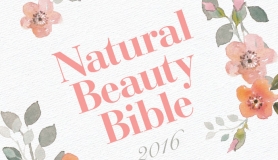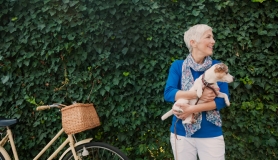Every evening before I go to bed, I step outside the kitchen door to check the stars. Are they blotted out by cloud? Outshone by the moon? Or twinkling bravely in an indigo sky? I savour the night air – cool or warm, calm or blustery. I could see the same stars from inside, through the window, but I wouldn’t feel so connected to the Earth, or to him.
Every week, we visit his grave on the outskirts of town. Which flowers are drooping and which still blooming bravely against the unrelenting east coast wind? Are the cheerful painted pebbles fading? Do the rainbow windmills still turn? Beyond the graveyard is the sea, at times grey and threatening, at times serene and sparkling; more often something in between. From the woods we hear the harsh caw of rooks, the softer coo of a wood pigeon. Startled deer leap away across the scrub.
Every month, I wonder, amazed, at how much time has already slipped by; at how we go on, without him. We go on, because his sisters need us to; because what else is there to do?; because it does not discredit his memory to say we have other things to live for; because he taught us so much that we must share; and because he strengthened and prepared us. He trained our senses to find reminders everywhere in nature, opened our hearts to feel the rhythms of the Earth more strongly, inspired our minds to perceive everything more keenly – from the flutter of a leaf to the passing of the seasons.
Parenting him was anything but natural: all tubes and wires, plastic and metal, beeps and hisses, ramps and wheels. Days, weeks, would slip by in the sterile, artificial environment of the hospital, so that when we emerged, we would find ourselves disorientated: trees that were bare now in full blossom, a sun that set after supper now barely lighting the way home from school, leaves once whipped up by the wind now lying crisp and motionless, coated in frost.
Parenting him was the most natural thing in the world: all hugs and murmurs, feeds and fluids, soft hair and softer cheeks, life and death. It was grounding: responding to the most basic human needs for sustenance, comfort, and belonging. It was instinctive: sensory connection and unspoken communication.
He was the second of our three children, our only boy, the centre of the family, the calm in the eye of his tearaway sisters’ storm. He was the one who made us slow, stop, take notice, and find joy in the world around us: see the sunlight through the leaves, hear the rain on the roof, feel the mud on your fingers, catch the sudden perfume as you break into an orange, sense the wind in your hair or the grains of sand between bare toes.
He died in winter. The car skidding on ice as I drove him to the hospital one last time; snow lying thick on the ground as I lay holding him in intensive care, as the strongest nurse slowed his futile chest compressions, and the surgeon gently withdrew the tube from his lungs. Everything outside muffled by snow. Everything inside muffled by shock.
We buried him in spring. The first real bright, breezy day of the year. Daffodils nodding, colourful balloons dancing. Our orange outfits attracted a confused, early bumble bee. We planted trees: a star magnolia, the apple “Ben’s red,” the currant “Ben Hope.” We hung a wreath of willow, dressed in cherry blossom.
We endured summer without him. Collecting seashells at low tide we marvelled at the glint of light on water, just as he, without words, would have done. Picnicking in the woods we noted how the sun, filtered by leaves, streamed in flawless rays to the bluebell-carpeted floor. As in life he showed us how to experience nature, in death nature reminded us how to look for him. We saw buds swelling on the apple trees, heard the first swifts darting and calling with energy and optimism, watched kittiwakes soar and starlings squabble. We followed the meandering yet mindful path of a painted lady butterfly. We dressed his wreath in sunflowers.
We find ourselves in autumn. The swifts and kittiwakes have departed for warmer climes; we are left with the squabbling starlings. Squirrels gather beechnuts at his graveside; apples fall heavily from the trees; elderberries one-by-one turn black and sloes an unbelievable blue. We dress his wreath with flame-coloured leaves.
Soon we will entwine it with holly, ivy, and Christmas rose. Before long a whole year will have passed. A turn of the calendar. A cycle of life. A readjustment, a getting used-to, a gap-filling, a noticing, a sensing. He has been with us in every pattering raindrop, every starlit night, every mackerel sky and every ocean breeze. In each pink-flushed magnolia opening to the sun and every daisy his sisters plucked from the grass. He brought nature into our lives and now, nature keeps him in ours.
RESOURCES
FIND Alex online at Instagram: @alex_davey13 and read her blog at thelongchain.wordpress.com







